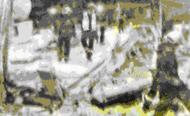Years ago, I lived in a building in a large city. The building next door was only a few feet away from mine. There was a woman who lived there, whom I had never met, yet I could see her sit by her window each afternoon, sewing(针线活) or reading.
After several months had gone by, I began to notice that her window was dirty. Everything was unclear through the dirty window. I would say to myself, “I wonder why that woman doesn’t wash her window. It really looks terrible.”
One bright morning I decided to clean my flat, including washing the window inside.
Late in the afternoon when I finished the cleaning, I sat down by the window with a cup of coffee for a rest. What a surprise! Across the way, the woman sitting by her window was seen clearly. Her window was clean!
Then it dawned on me. I had been criticizing(批评) her dirty window, but all the time I was watching hers through(通过) my own dirty window.
That was quite an important lesson for me. How often had I looked at and criticized others through the dirty window of my heart, through my own mistakes?
Since then, whenever I wanted to judge (评判) someone, I asked myself first, “Am I looking at him through my own dirty window?”
Then I try to clean the window of my own world so that I may see the world about me more clearly.
小题1:The writer couldn’t see everything clearly through the window because _________.
| A.the woman’s window was dirty |
| B.the writer’s window was dirty |
| C.the woman lived nearby |
| D.the writer has short sight |
小题2:The writer was surprised that _________.
| A.the woman was sitting by her window each afternoon, sewing or reading |
| B.the woman’s window was clean as soon as he washed his own window |
| C.the woman did cleaning in the afternoon, so the writer could see the woman clearly |
| D.the woman’s window was still terrible after he washed his own window |
小题3: “It dawned on me” probably means “_________”.
| A.I began to understand it |
| B.it cheered me up |
| C.I knew the woman’s window grew light |
| D.it began to get dark |
小题4:It’s clear that _________.
| A.the writer didn’t meet the woman ago |
| B.the writer often washed the window |
| C.they both worked as cleaners |
| D.they lived in a small town |
小题5:From the passage, we can learn _________.
| A.one shouldn’t criticize others very often |
| B.one should often make his windows clean |
| C.one must judge himself before he judges others |
| D.one must look at others through his dirty windows |



 名校课堂系列答案
名校课堂系列答案 see anything unusual. They were ____27______.
see anything unusual. They were ____27______.